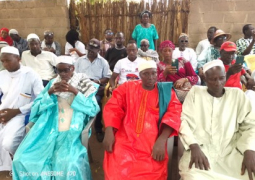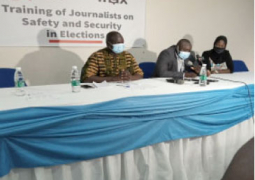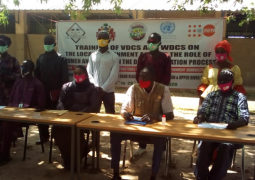The move comes as The Gambia embarks on the full implementation of its ongoing transitional justice process. Also the training which was supported by the Chicago-based MacArthur Foundation and held in collaboration with the Justice Ministry, was aimed at introducing participants to the AUTJP and its norms, principles and outcomes, as well as identify concrete ways in which the AUTJP can guide the formulation of a national transitional justice policy.
It would be recalled that the African Union adopted a Transitional Justice Policy in February 2019 to serve as a guideline for AU member states and to develop their own context-specific comprehensive policies, strategies and programmes towards democratic and socio-economic transformation. This according to officials would help in achieving sustainable peace, justice, reconciliation, social cohesion and healing.
Addressing the gathering, Edmond Amarkwei Foley, interim head of IHRDA, explained that as part of national engagement, they recognised the Gambia's membership of the international committee of nations and a member of the African Union.
“Indeed, within the African circles, the Gambia is well respected for being the home of the African Union Charter on Human and People’s Rights, which is affectionately called The Banjul Charter.
“So, it is proper that we also have recourse on some of the development at the African Union level, and it is in this spirit that we are gathered as key stakeholders in this transitional justice process to reflect on the African Union Transitional Justice Policy and see how we can borrow from it and strengthen our own national policy framework.” he explained.
Deputising for the Attorney General and Minister of Justice, Alieu Jallow, registrar of Companies, acknowledged the unflinching support of regional and international partners, especially the African Union, saying these partners have been instrumental in supporting the country’s justice process since the onset.
Jallow thus expressed gratitude to IHRDA for their commitment in supporting The Gambia towards attaining its aim to ensure an equitable society.
He further urged participants to make best use the platform and to share ideas and experiences as they work towards a common goal of building the country.
Established in 1998, IHRDA was founded by two human rights lawyers namely, Julia Harrington and the late Alpha Fall, who formerly worked for the Secretariat of the African Commission on Human and Peoples’ Rights. The pan–African NGO over the years is working to promote awareness of human rights in Africa and improve the effectiveness of the African Human Rights system, as it envisions an African continent where all have access to justice via national, African and international human rights mechanisms.




